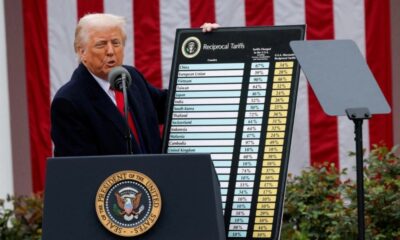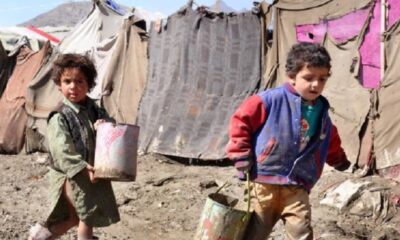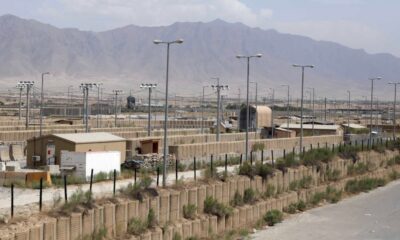Business
Afghanistan’s exports total $2 billion for last solar year
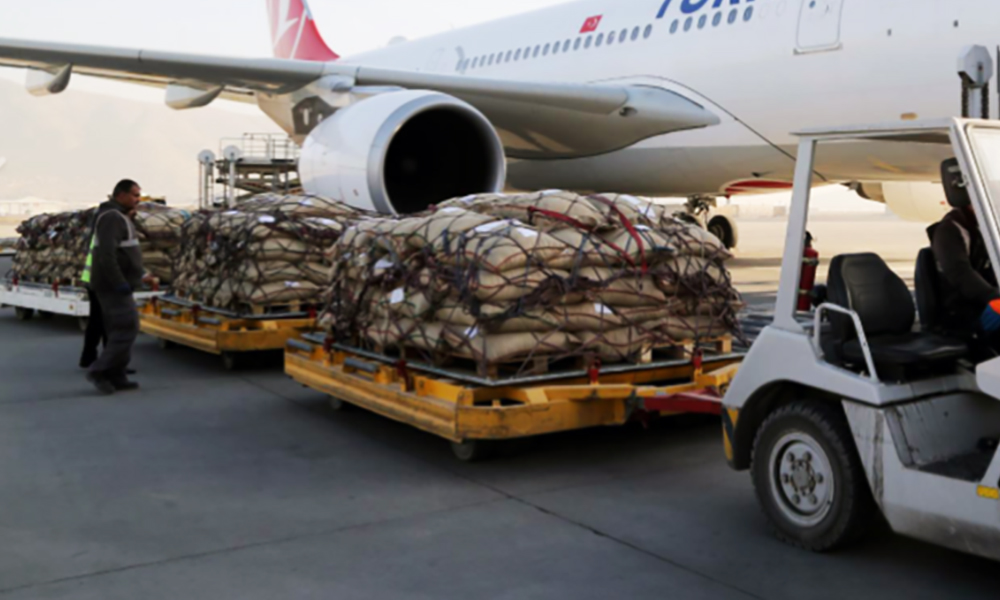
The deputy minister of trade and industry said on Tuesday at a press conference that Afghanistan’s exports totaled $2 billion for the past solar year.
Presenting his financial report for the 1401 solar year, Mawlavi Qadratullah Jamal said: “For the first time, Afghanistan’s exports have reached about two billion dollars, which shows an increase of 135 percent compared to [solar year] 1400 and 166 percent compared to 1399.”
According to the deputy minister, the recent actions of the Islamic Emirate’s administrations on improving the trade balance, maintaining monetary stability, creating work opportunities and providing transparency in revenue collection are among the reasons for the growth in Afghanistan’s trade and export revenue.
“During the last year, with a total value of $925.5 million, coal, cotton, hemp, pomegranate, raisins, figs, grapes, Roman eggplant, black pine nuts and onions to Pakistan, India, Uzbekistan, Tajikistan, United Arab Emirates, China, Iran, Iraq, Turkey and Kazakhstan have been exported,” Jamal said.
Officials add that in order to standardize and increase the country’s exports, the ministry plans to establish export processing centers in five zones around the country.
Officials have also said that the necessary facilities have been provided for importing goods and that the private sector can import their goods without any problems.
The deputy minister added that in order to strengthen trade, facilitate exports and imports and expand cooperation between countries, necessary arrangements have been made with neighboring countries such as Iran, Pakistan, Russia, China, Uzbekistan, and Turkmenistan.
The officials of the ministry say that in terms of development and improvement of the industry in Afghanistan, fundamental steps have been taken, which includes growth in 50 sectors – including the iron smelting and skewer production sector, the spice sector, the soft drink production sector, the carpet sector and the printing sector.
According to the ministry, there are 51 industrial parks in the country, of which 14 industrial parks have been kept active during the last year, and efforts are underway to attract investment and reactivate all industrial parks.
According to the officials, in terms of attracting domestic and foreign investments, by providing the necessary facilities, the barriers to the investors have been removed.
Recently, a service center was established at the Kabul airport, and so far, 100 investors have received visas through this center. In addition, the ministry has created a legal and regulatory framework so that domestic and foreign investors can invest in the country with full confidence.
Also, the complex and time-consuming processes have been modified and now the private sector and entrepreneurs can receive, renew or cancel their licenses in the shortest possible time, officials said.
According to the ministry, during the last year, 5,100 licenses were distributed, 7,228 licenses were renewed and 333 licenses were canceled and 7,000 business passports were also distributed.
According to officials, during the year 1401, the amount of 341.6 million afghanis was allocated to this ministry and the amount of 15.5 million afghanis was allocated to this ministry, of which 83.3 percent of this amount was used.
Also, in 1401, a total amount of 704.48 million afghanis was collected, which shows a 43.37 percent increase compared to last year.
Business
Afghanistan business sector eager to attend Kazan Halal Expo and Forum in Russia
The forum will run from May 13 to 18 and will bring together experts from Russian regions; OIC member states; and other countries
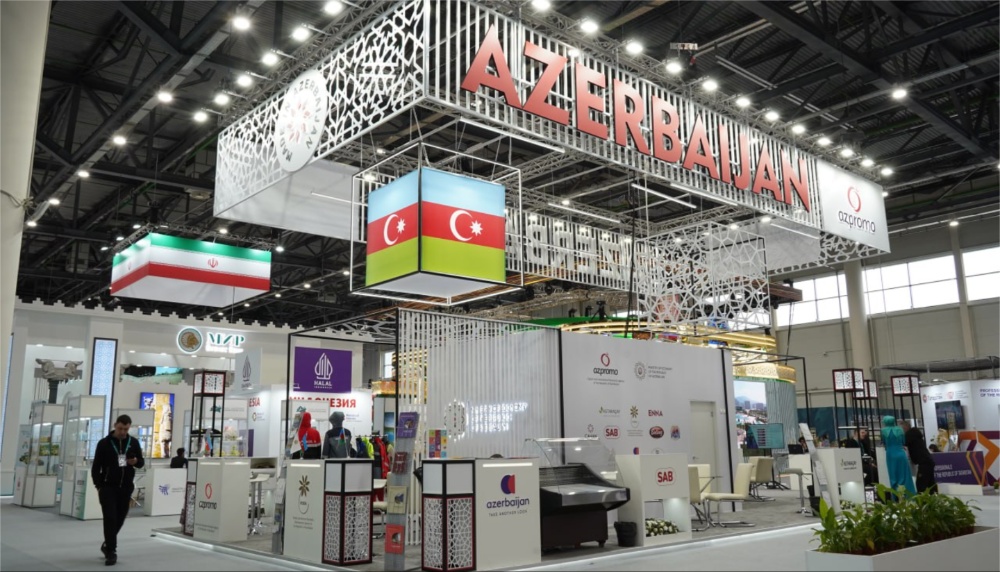
The Ministry of Industry and Commerce has confirmed that Afghanistan will participate in the XVI (16th) International Economic Forum ‘Russia — Islamic World: Kazan’ and the Kazan Halal Expo in Russia this year.
The forum will run from May 13 to 18 and will bring together experts from Russian regions; the Organization of Islamic Cooperation (OIC) member states; and other countries to discuss various topics during the 120 sessions planned.
The expo meanwhile will showcase thousands of goods from around the world that meet Halal standards.
Abdul Salam Javad Akhundzada, the ministry’s spokesman, said Sunday that Minister of Industry and Commerce Nooruddin Azizi has stated that Afghanistan is ready to participate in the event and showcase Afghan products.
According to Akhundzada, Azizi has discussed the event with members of the private sector who are eager to participate.
The expo, which is held annually alongside the forum, is Russia’s largest trading platform for Muslims.
Russia’s President Vladimir Putin said in a statement on the forum and expo recently that “Russia values its traditionally friendly ties with Muslim countries. We highly appreciate their desire to pursue an independent foreign policy and increase their role in international affairs.
“Together, we stand for the formation of a democratic multipolar world order, based on the rule of law and principles of justice, free from any form of dictatorship and discrimination.
“Of course, we are also committed to expanding mutually beneficial cooperation in all areas, from trade and investment to sports and tourism,” he said.
Putin went on to say “I believe that the work of the forum will be meaningful and constructive as always and will be held in a spirit of openness and trust. It will serve to further promote the friendship and creative partnership between our countries and peoples.”
The forum will bring together experts from Russian regions, the Organization of Islamic Cooperation (OIC) member states, and other countries to discuss:
Business
Iran exports non-oil goods worth over $2 billion to Afghanistan in 11 months
Afghanistan was Iran’s fifth top export destination between March last year and February this year
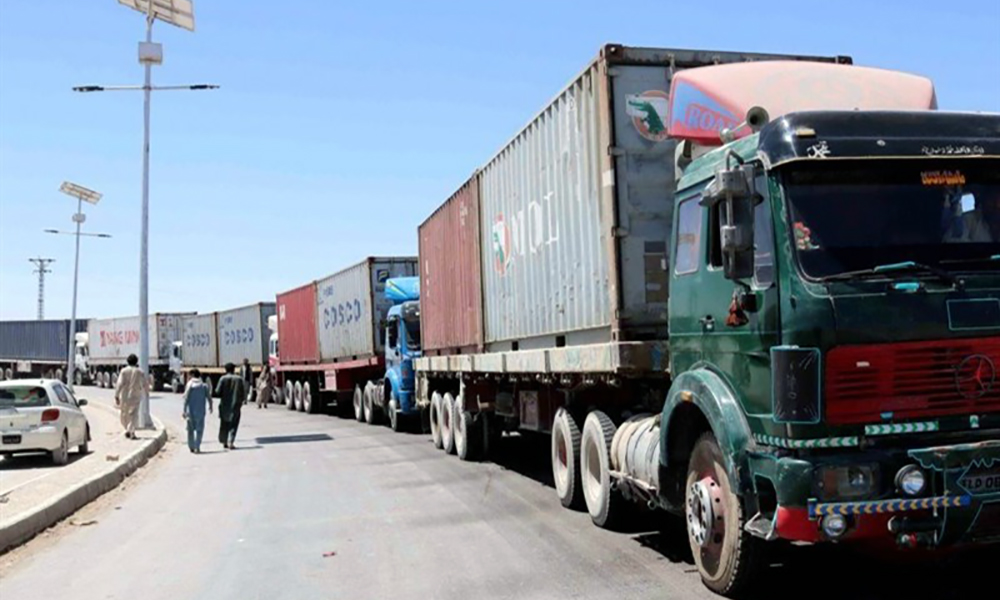
Iran exported non-oil commodities worth $2.2 billion to Afghanistan during the 11-month period from March 20, 2024 to February 18, 2025, the head of Iran Customs Administration (IRICA) said.
Foroud Asgari said Afghanistan was Iran’s fifth top export destination in the mentioned 11-month period, Tehran Times reported Sunday.
In the past year, Afghanistan and Iran have forged closer trade ties. In February, the governors of both central banks met on the sidelines of a banking technology summit in Yekaterinburg, Russia, where they discussed strengthening monetary and banking cooperation.
Also, in October, ports and maritime officials of Iran and Afghanistan met to discuss investment opportunities for the Afghan private sector in Iran’s southeastern Chabahar Port.
Tehran Times reported that this meeting was attended by the director general of the Ports and Maritime Department of Sistan-Baluchestan Province, the governor-general of the province, some Iranian MPs, and officials of the Afghanistan Trade and Industry Ministry.
Meanwhile, in a meeting with an Iranian trade delegation in Kabul last August, Afghanistan’s interim Deputy Prime Minister Mullah Abdul Ghani Baradar Akhund said that his country is eager to attract Iranian investors in order to develop the Afghan mining industry, generate solar electricity and expand railway connectivity.
The Iranian delegation also proposed to launch a joint special industrial zone with Afghanistan.
Afghanistan supplies more than 80 percent of its market needs through imports, and imports from Iran constitute 25 percent of this amount.
The establishment of national security and the central government in Afghanistan over the past two years have improved the conditions of trade between the two countries.
Business
Trump unveils first $5 million ‘gold card’ visa

Holding a prototype that bore his face and an inscription “The Trump Card”, the Republican president told reporters that the special visa would probably be available “in less than two weeks”.
“I’m the first buyer,” he said. “Pretty exciting, huh?”
Trump previously said that sales of the new visa, a high-price version of the traditional green card, would bring in job creators and could be used to reduce the US national deficit.
The billionaire former real estate tycoon, who has made the deportation of millions of undocumented migrants a priority for his second term, said the new card would be a route to highly prized US citizenship.
He said in February that his administration hoped to sell “maybe a million” of the cards and did not rule out that Russian oligarchs may be eligible.
(AFP)
-

 Business4 days ago
Business4 days agoExports to Pakistan grind to a halt over faulty scanner at Torkham
-

 Regional4 days ago
Regional4 days agoMilitary confrontation seems inevitable if no new Iran nuclear deal, France says
-

 Business4 days ago
Business4 days agoTrump imposes 10% tariff on imports from Afghanistan
-

 Climate Change5 days ago
Climate Change5 days agoTornadoes, heavy rains rip across central, southern US
-

 International Sports4 days ago
International Sports4 days agoIPL 2025: Sunday’s KKR vs LSG match pushed out to Tuesday
-

 Business3 days ago
Business3 days agoTrump unveils first $5 million ‘gold card’ visa
-

 Latest News3 days ago
Latest News3 days agoKhyber Pakhtunkhwa chief minister proposes permanent residence for Afghan refugees
-

 Latest News3 days ago
Latest News3 days agoSixty Afghans rounded up in Rawalpindi and Islamabad






